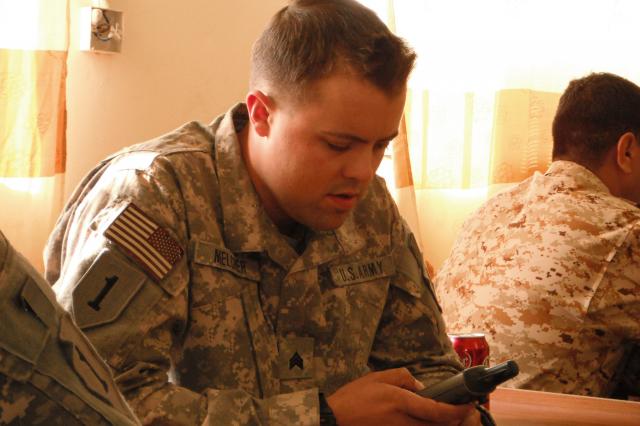December has been a busy month for Soldiers with Company B, 1st Battalion, 63rd Armor Regiment, 2nd Advise and Assist Brigade, 1st Infantry Division, United States Division – Center. The first week of the month was a flurry of activity, as the company transitioned into its new role in Iraq while training, advising and assisting their Iraqi Security Forces partners.
After assuming responsibility, one of the first tasks the company undertook was to conduct combined land navigation training with Soldiers of the 6th Iraqi Army Division.
Soldiers from both units began training Dec. 13, during the early morning hours. Together, they focused on learning basic land navigation skills; skills that are essential to any modern military force.
Solid knowledge of navigation tools and techniques can allow Soldiers to move quickly and accurately on the battlefield, while taking maximum tactical advantage of terrain, said 2nd Lt. Kyle Litchfield, with Company B, 1st Bn., 63rd Armor Regt.
The training began with tasks designed to build the students’ understanding of navigation tools, like maps, compasses and GPS devices.
Both old and new navigation tools have benefits and drawbacks. While maps never run out of batteries or break, they lack the ability of a GPS device to track current location through the use of satellite signals. Generally, Soldiers use both means of navigation, Litchfield said.
The Soldiers with the 6th IA Div. laid a foundation for more advanced work by first learning standard map reading techniques, including recognizing major terrain features and plotting locations on the map. These two techniques, used together, give Soldiers a logical and mathematical technique for locating themselves on a map.
The Iraqi Soldiers built on their skills, learning to navigate using a GPS device. With a GPS device, Soldiers can plan and store routes electronically and follow directions to arrive at their destination, even when traveling cross country. In order to familiarize themselves with GPS capabilities, U.S. and Iraqi Soldiers worked together to navigate to a series of locations using GPS devices.
Sgt. Joseph Harleman, with Company B, 1st Bn., 63rd Armor Regt. said the teams performed well and the shared experience helped to build a sense of teamwork and camaraderie.
During the course, Soldiers from both countries spent time teaching each other. U.S. Army Noncommissioned Officers and Soldiers taught the first half of the course, and Iraqi Army officers taught the second half.
“The student-teaching segment was extremely successful,” Litchfield said. “Our platoon trainers filled sheets of notes and had no serious critiques of the instruction.”
A number of Iraqi Army officers performed particularly well during the training and were identified as future instructors, Litchfield said.
Company B intends to continue conducting missions throughout their deployment, Litchfield said, that enable its partnered Iraqi units to provide internal and external security for the people of Iraq more effectively.











